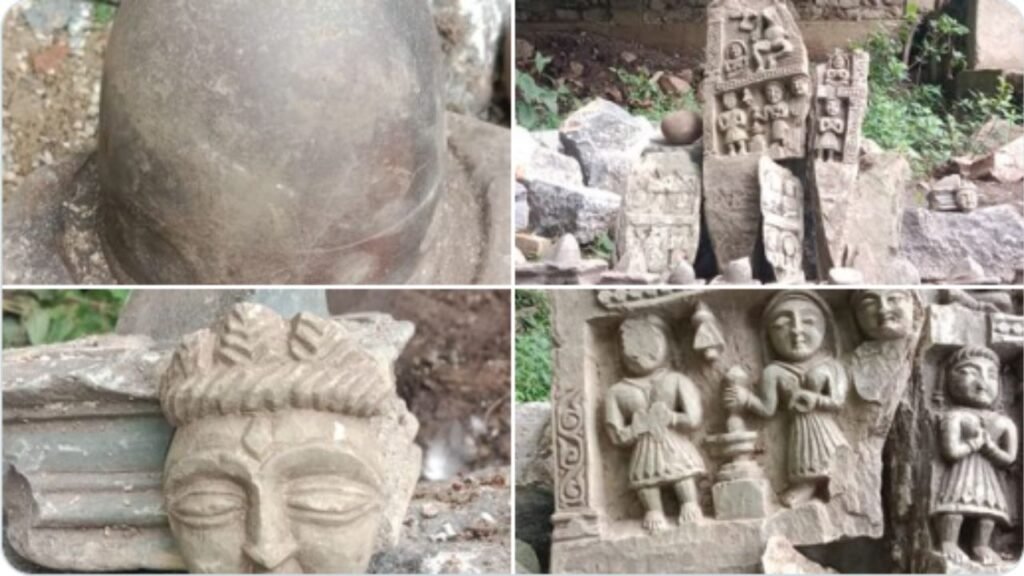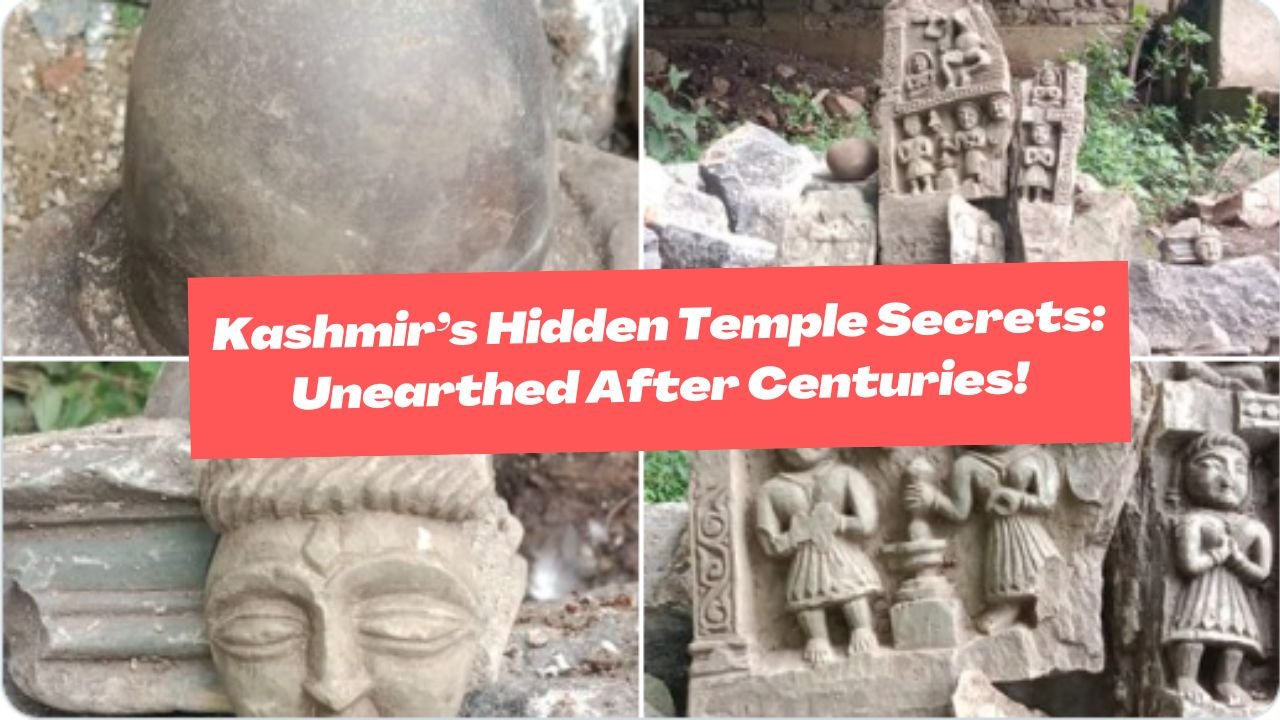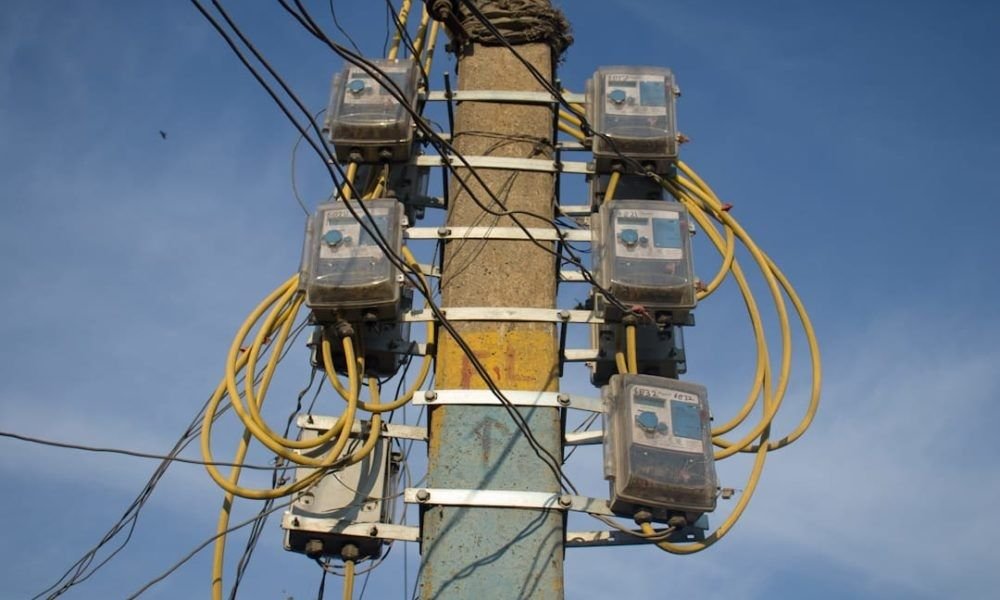In a stunning revelation that has sent waves across the religious and archaeological communities, multiple Shivlings and a damaged ancient hindu idols have been discovered during an excavation at the Karkut Nag shrine in the Veil Nagabal area of Salia, located in Anantnag district, South Kashmir. This significant find comes as part of a broader restoration and development initiative by the Jammu and Kashmir Government, aiming to revive ancient Hindu pilgrimage sites in the region.
The excavation work, carried out as part of the temple restoration, led to the unearthing of several Shivlings, some of which were unfortunately found in a damaged condition. Among the most intriguing findings is a broken sculpture depicting multiple deities, believed to be a fragment of a temple pillar that once stood in the area centuries ago.
The Shivlings, traditionally symbolic representations of Lord Shiva, are considered sacred in Hinduism. Many of these were likely used for “Abhishek” rituals, where devotees perform ceremonial bathing of the Shiva Lingam using milk, honey, water, and other offerings — a core element of Shaivite worship.
Experts Call for Detailed Study to Trace Historical Roots
Teams from the Department of Archives, Archaeology, and Museums, Government of Jammu and Kashmir, were present at the site to document and assess the relics. According to them, the unearthed stones and sculptures, many featuring carvings of Hindu deities, warrant detailed study and carbon dating to determine their precise age and cultural origin.
While digging few Shivalingams and sculptures where found at Karkut naag salia Anantnag.This is proof to those who had any iota of doubt that place belonging to Kashmiri Pandits. @searchkashmir @KnowYourTemples @AdityaRajKaul @37VManhas @AadiAchint @AartiTikoo @SP_Vishwasrao pic.twitter.com/Fr6dg3a4Eh
— GaashTaarukh 𑆓𑆳𑆯 𑆠𑆳𑆫𑆶𑆒🌟🇮🇳 (@Gash_Tarukh) August 2, 2025
These findings not only highlight the deep-rooted presence of Hinduism in the region but also reinforce the need for systematic archaeological research at historically significant sites across the Kashmir Valley.
The Significance of Karkut Nag Shrine in Kashmiri Hindu Tradition
The Karkut Nag Kund holds immense religious importance, especially for Kashmiri Pandits, who regard the site as sacred. It is believed to be associated with Naga Karkut, a serpent deity deeply revered in ancient Kashmiri folklore. Interestingly, the site is also associated with both Lord Shiva and Lord Vishnu, making it a unique dual-deity pilgrimage site where devotees worshipped both manifestations over the centuries.
This dual significance underscores the spiritual depth of Kashmiri Shaivism and Vaishnavism, traditions that thrived before the demographic changes of the last few decades.
Read also: Must-Visit Lord Shiva Temples in Jammu & Kashmir in Mahashivratri
Temple Restoration in Progress: Calls for Revival of Karkut Nag’s Glory
The excavation was attended by members of the Papharan Nag Karkut Nag Trust, who have long been advocating for the shrine’s restoration. According to the Trust, Karkut Nag was once a thriving pilgrimage centre, drawing Hindu devotees from far and wide for meditation and worship. They expressed gratitude to the government for initiating the development but also stressed the urgent need to construct a proper temple structure to revive the sanctity and historic legacy of the site.

The Trust also urged authorities to ensure protection of the newly discovered relics and to display them in a way that educates the public about their historical and spiritual importance.
This recent discovery at Karkut Nag once again shines a light on Kashmir’s forgotten Hindu heritage, a legacy that predates centuries of upheaval and conflict. As the Jammu and Kashmir Government continues its mission to preserve ancient religious sites, the findings at Veil Nagabal may serve as a powerful reminder of the region’s pluralistic and spiritually rich past.
With continued archaeological support, community involvement, and state-led initiatives, the revival of sacred spaces like Karkut Nag may not only help restore lost heritage but also reconnect communities with their historical and religious roots.
















